A Snapshot of Autism Spectrum Disorder in Arizona
‹View Table of Contents
Download and print this page [PDF – 245 KB, Print Only]
Findings from the Arizona Developmental Disabilities Surveillance Program (ADDSP) help us to understand more about the number of children with autism spectrum disorder (ASD), the characteristics of those children, and the age at which they are first evaluated and diagnosed.
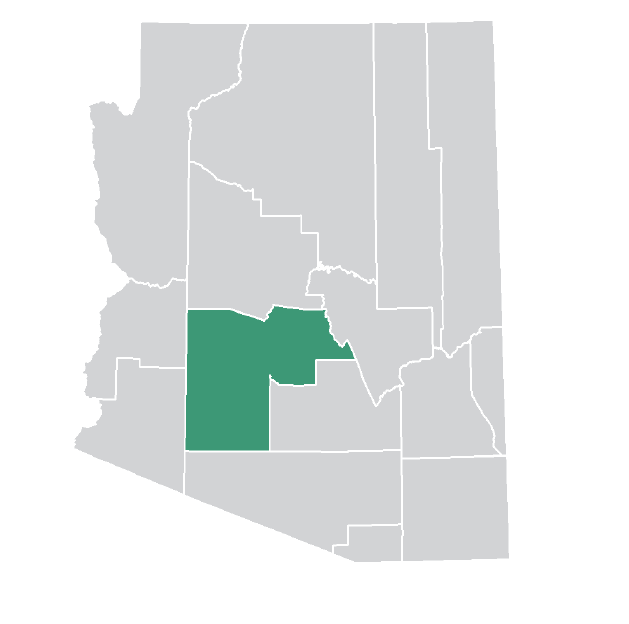
![]() SITE TRACKING AREA
SITE TRACKING AREA
Or 2.7% of 8-year-old children were identified with ASD in ADDSP in 2020.
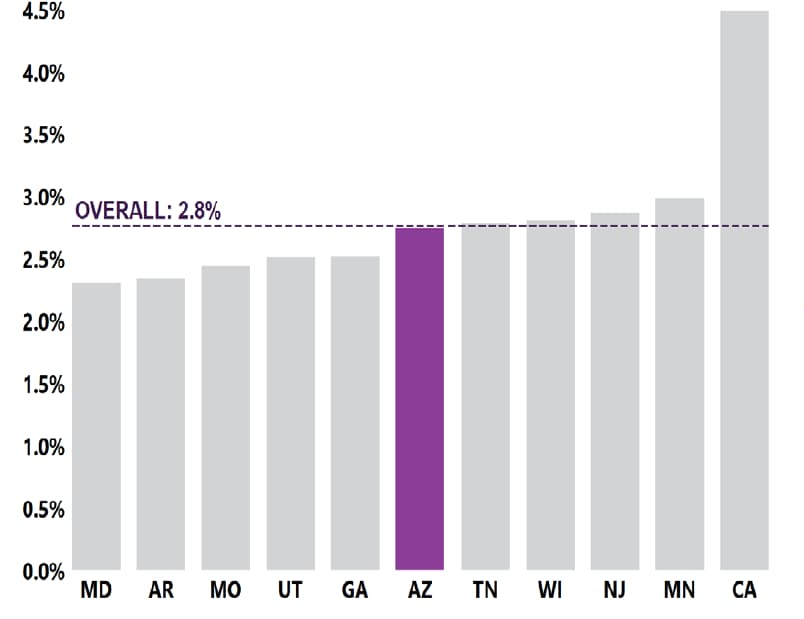
This percentage is similar to the overall percentage identified with ASD (2.8%) in all communities where CDC tracked ASD among 8-year-olds in 2020.
or 1.6% of 4-year-old children were identified with ASD by ADDSP in 2020.
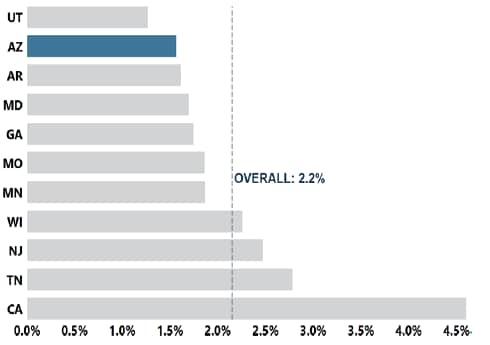
This percentage is lower than the overall percentage identified with ASD (2.2%) in all communities where CDC tracked ASD among 4-year-olds in 2020.
Children who were age 4 years (1.1%) were 1.5 times as likely to receive ASD diagnosis or ASD special education classification by 48 months of age compared to children who were age 8 years (0.72%).
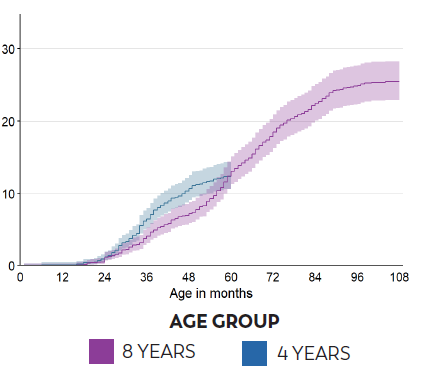
The COVID-19 pandemic disrupted many aspects of life, including the ability to evaluate children for ASD. In the early months of the pandemic, 4-year-old children were less likely to have an evaluation than 8-year-old children when they were they were the same age.
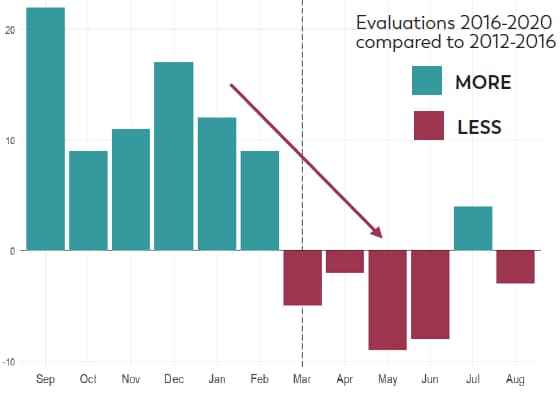
IQ data available for 81%
Of 8-year-old children identified with ASD by ADDSP
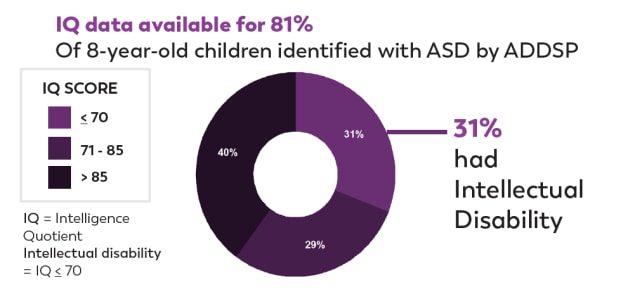

What are the key take-away messages from Arizona’s data?
- More children with average intelligence are being identified with ASD since ADDSP began tracking in 2000.
- As has been seen in previous years, the percentage of boys identified with ASD is higher than the percentage of girls; a better understanding of sex differences may also lead to the development of more effective screening tools for ASD in boys and girls.
- More children are being diagnosed with ASD by age 4 years than in previous reports.
How can this information be useful?
ADDSP’s latest findings can be used to
- Promote early identification of ASD.
- Plan for the service needs of individuals with ASD and provide trainings related to ASD for healthcare providers and families.
- Guide ASD research.
- Inform policies that promote improved outcomes in health care and education for individuals with ASD.
- Identify cultural, educational, and economic barriers to decreasing the age of evaluation for and diagnosis of ASD.
- Inform efforts to improve screening tools for ASD.
- Improve screening tools to increase accurace of screening for ASD.
- Improve collaborations in the ASD community among providers, researchers, and families.
Where was this information collected?
8-year-old children in tracking area: 13,118
- 40% White
- 7% Black
- 42% Hispanic
- 3% Asian or Pacific Islander
- 3% American Indian or Alaska Native
4-year-old children in tracking area: 13,349
- 38% White
- 7% Black
- 44% Hispanic
- 3% Asian or Pacific Islander
- 3% American Indian or Alaska Native
ADDSP uses a record review method. Specifically, this information is based on the analysis of data collected from the health and special education records of children who were 4 years old and 8 years old and living in part of Maricopa county in metropolitan Phoenix in 2020.
What else does ADDSP do besides provide estimates of ASD?
ADDSP collaborates with the Arizona Department of Health Services and scholars from the University of Arizona to track the percentage and characteristics of 4-year-old and 8-year-old children with ASD. ADDSP also provides extensive ASD and developmental disabilities-related outreach to and training of students, parents, educators, and clinicians. Further, ADDSP data help guide ASD research in the public health community. ADDSP seeks to expand research on adults with ASD.
“Before this surveillance initiative focused our collective attention on autism, prevalence was extremely underestimated. Since its inception, though, it has most certainly encouraged healthcare professionals and community members alike to better monitor autism in the U.S. The trends we see through data collected, continue to create awareness and urgency, as well as, add a watchful lens on the significant changes in our healthcare systems — like revisions in diagnostic criteria, or efforts to improve early detection and screening. But perhaps most important, surveillance has shown us there is an substantial need within our community for added support, resources and awareness.”
– CHRISTOPHER SMITH, PhD
Southwest Autism Research and Resource Center (SARRC).
Resources
GET RESOURCES AND CONNECT FAMILIES TO SERVICES AND SUPPORT IN ARIZONA
ARIZONA AUTISM COALITION
www.azautism.org/
ARIZONA EARLY INTERVENTION PROGRAM
602-542-4446
https://des.az.gov/azeip
AZ FIND
978-637-1871
http://www.azed.gov/special-education/az-find/
AZA UNITED
602-773-5773
https://azaunited.org/
CDC’S LEARN THE SIGNS. ACT EARLY.
Megan Wills
Arizona’s Act Early Ambassador
https://Mwills@blake.easterseals.com
RAISING SPECIAL KIDS
602-242-4366
www.raisingspecialkids.org/
SOUTHWEST AUTISM RESEARCH AND RESOURCE CENTER (SARRC)
602-340-8717
www.autismcenter.org/
AUTISM SOCIETY OF GREATER PHOENIX
480-779-0899
https://phxautism.org
AUTISM SOCIETY OF SOUTHERN ARIZONA
520-770-1541
www.as-az.org/
CONNECT WITH ADDSP
Sydney Pettygrove, PhD
University of Arizona Health Sciences Center
sydneyp@arizona.edu
Pages in this Report
- 2023 Community Report on Autism
- Executive Summary
- Key Findings from the ADDM Network
- A Deeper Dive
- Spotlight On: Progress in Early Identification Disrupted during the COVID-19 Pandemic
- Spotlight On: A New Pattern in Racial and Ethnic Differences
- Data for Action
- ADDM Network Site Snapshots Overview
- ›A Snapshot of Autism Spectrum Disorder in Arizona
- A Snapshot of Autism Spectrum Disorder in Arkansas
- A Snapshot of Autism Spectrum Disorder in California
- A Snapshot of Autism Spectrum Disorder in Georgia
- A Snapshot of Autism Spectrum Disorder in Maryland
- A Snapshot of Autism Spectrum Disorder in Minnesota
- A Snapshot of Autism Spectrum Disorder in Missouri
- A Snapshot of Autism Spectrum Disorder in New Jersey
- A Snapshot of Autism Spectrum Disorder in Tennessee
- A Snapshot of Autism Spectrum Disorder in Utah
- A Snapshot of Autism Spectrum Disorder in Wisconsin
- Glossary
- References